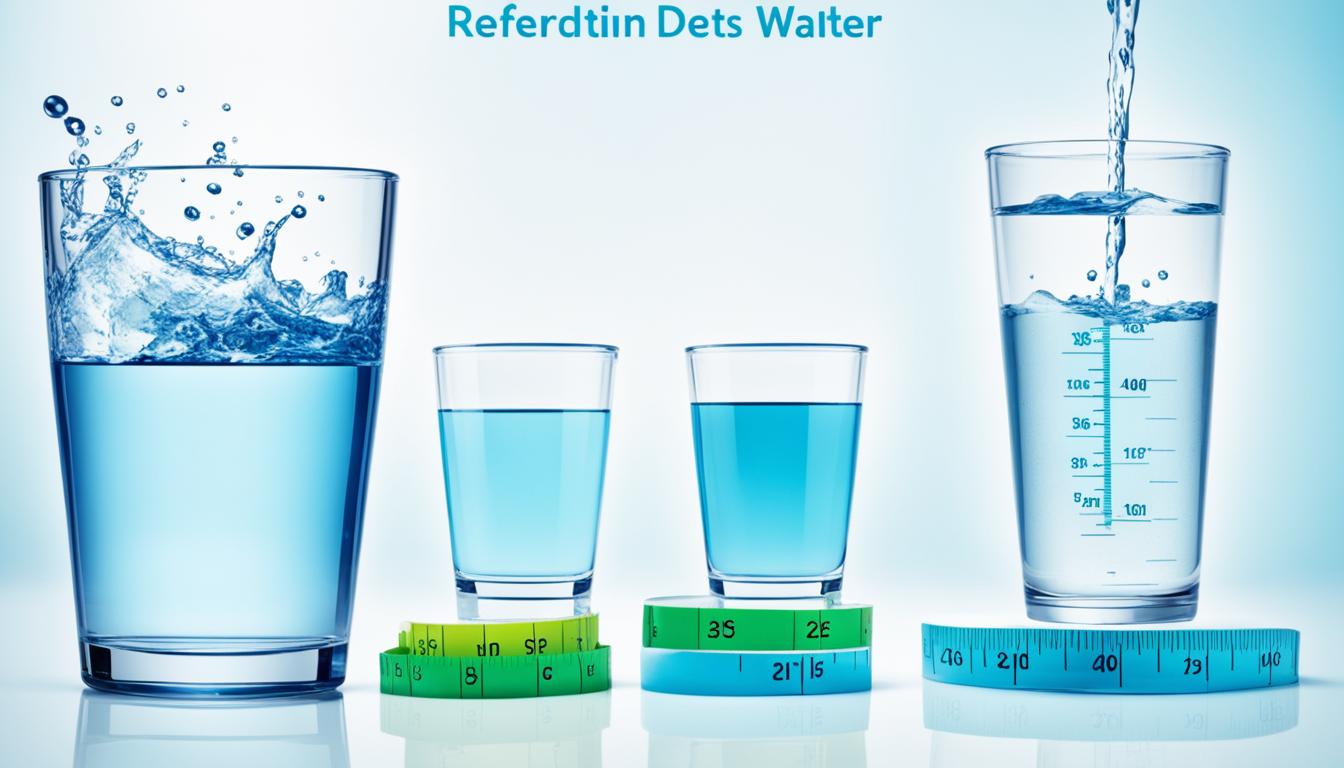Water diet weight loss has gained significant traction in recent years, and for good reason. Groundbreaking research published in Nature Metabolism journal reveals a seven-day water fast’s effects on the human body, including weight loss and improved organ function. Prominent researcher Claudia Langenberg, from Queen Mary’s Precision Health University Research Institute, emphasizes the health benefits of fasting are evident after three days.
In a controlled study involving 12 volunteers, an average weight loss of 12.5 pounds was noted, with a significant portion being fat mass. The study, conducted by Queen Mary University of London and the Norwegian School of Sports Sciences, discovered that this fasting method promoted changes in whole-body protein levels, optimizing brain neuron support structures. However, experts caution against fasting for individuals in ill health and stress the importance of medical supervision during fasting.
Key Takeaways
- Water diet weight loss shows significant results in a short period.
- Drinking more water is linked with an average weight loss of 5%, as per a 2019 review.
- A 2021 study found drinking only water for 5 days resulted in a weight loss of nearly 11 pounds for non-obese individuals.
- Recommends medically supervised fasting to avoid potential health risks.
- Replacing sugar-sweetened beverages with water can reduce long-term weight gain.
- Maintaining adequate hydration supports overall bodily functions, as the human body is approximately 60% water.
Introduction to Water Diets
Water diets involve consuming only water, withholding all food and beverages for a set period, usually spanning from 24 to 72 hours. These diets are sometimes driven by various motivations including religious practices, detoxification, health improvements, or preparation for medical procedures. Multiple studies suggest that such diets can lead to significant health benefits, including the reduction of chronic disease risks like cancer, heart disease, and diabetes.
One of the primary inquiries people have about water diets is how much weight can I lose with a water diet. Evidence shows that water fasting can lead to rapid weight loss. For instance, a 2013 study found that a 24-hour water fast led to lower blood levels of triglycerides in healthy adults, which can support weight management. Water fasting might also suppress specific genes that contribute to the growth of cancer cells and can potentially improve the effectiveness of chemotherapy.
Popular diet programs like the lemon detox cleanse are modeled after water fasting concepts and can extend up to 7 days. While such initiatives have gained popularity, they can present significant risks if not managed correctly. Given that approximately 20-30% of daily water intake comes from food, standing only on water can sometimes lead to dehydration. This dehydration can result in orthostatic hypotension, a condition where blood pressure drops significantly, causing dizziness or fainting.
It’s crucial for people with conditions like gout or eating disorders to refrain from water fasting without medical oversight. Despite these precautions, the reported water diet results have garnered interest due to improved systolic blood pressure under medical supervision, typically after an average of 17 days of fasting. Historically, water fasting has been practiced for spiritual or religious reasons but has also been recognized as a method for health promotion, including efforts towards weight loss and enhanced longevity.
Furthermore, experts advocate for water fasting under a controlled environment and recommend intake of 2-3 liters of water daily, preferably mineralized, to replenish lost minerals. To avoid adverse effects, it is advisable to limit fasting to 24 hours and avoid strenuous activities. Post fasting, a gradual reintroduction of food is recommended, ideally starting with a Mediterranean diet rich in whole foods such as fruits, vegetables, legumes, nuts, and lean proteins. This approach helps to maximize the water diet results while ensuring a balanced nutrition profile.
How Much Weight Can I Lose with a Water Diet?
The relationship between water fasting and weight loss has captivated both researchers and health enthusiasts alike. As the body switches to utilizing fat stores for energy during a water fast, there is a significant reduction in both fat and lean mass over a short span. This mechanism, highlighted by studies conducted at Queen Mary University, underscores the effectiveness of water fasting for weight loss.
The Science Behind Water Fasting Studies
Research conducted in 2023 found that individuals drinking 200–250 mL of warm water post-meal experienced greater weight loss and a lower BMI compared to those who didn’t. Additionally, health authorities recommend a daily intake of 2 liters for females and 3 liters for males, accentuating the importance of adequate water intake for weight loss initiatives. Transitioning fat stores to energy during fasts not only sheds fat mass but also impacts lean mass, as observed in Queen Mary University’s research.

In a 2019 review, weight loss ranged from 0.4 to 8.8 kg, with an average weight loss of 5%. This broad spectrum showcases the varying effects of water fasting results based on individual differences and adherence to water intake recommendations. Moreover, a 2021 study revealed that fasting with only water for five days led to a weight loss of around 5 kg, validating the quick and impactful nature of this diet method.
Average Weight Loss
On average, participants in controlled studies noted a weight loss of approximately 12.5 pounds during water fasting, attributable to supervised water intake and medical monitoring. This structured approach aids in managing the dual reduction of fat and lean mass, ensuring a balanced loss. Remarkably, the restoration of lean mass post-fast differs from the non-restored fat mass, emphasizing the short-term efficacy of water fasting for immediate weight loss.
With subjects consuming an extra cup of water daily reducing weight gain by 0.13 kg, and substituting sugary drinks with water achieving a 0.5 kg reduction over four years, it’s evident that consistent water intake supports weight management. As such, understanding water fasting results and optimizing water intake for weight loss remain critical for those pursuing weight management through dietary modifications.
Water Diet Benefits Beyond Weight Loss
In addition to weight loss, water diets present several significant health benefits. Studies show that water fasting can effectively enhance various bodily functions, contributing to overall well-being.
Improved Brain Function
Water fasting stimulates whole-body protein level changes, optimizing the performance of organs, including the brain. Enhanced brain function is linked to increased production of brain-derived neurotrophic factor (BDNF), which supports neuron growth and differentiation, leading to improved cognitive function and mental clarity. This highlights the potential benefits of drinking water for weight loss and brain health.
Lowered Blood Pressure
An integral advantage of water fasting is its role in lowering blood pressure. Research indicates that individuals with hypertension often achieve healthier blood pressure levels following a period of water fasting. This is particularly beneficial for those seeking to mitigate the risks associated with high blood pressure through natural methods. Hence, the water diet benefits extend beyond weight loss, contributing to cardiovascular health.
Enhanced Autophagy
Autophagy, the body’s process of cell recycling and regeneration, is significantly promoted through water fasting. This regenerative process plays a crucial role in protecting against diseases like cancer and Alzheimer’s. Enhanced autophagy helps in detoxifying the body, removing damaged cells, and generating new, healthy cells, underscoring the multifaceted benefits of drinking water for weight loss.
These benefits emphasize the multiple health advantages of a water diet, reinforcing why it’s a popular choice for those eager to improve their overall health.
Potential Risks and Side Effects
While water fasting can offer numerous health benefits, it also carries significant risks that should not be overlooked. In this section, we will explore two major concerns: dehydration and muscle mass loss.
Dehydration
Dehydration is a common risk associated with water fasting. During typical eating routines, we get a substantial portion of our daily water intake from the foods we consume. Therefore, when on a water fast, ensuring adequate daily consumption of 2-3 liters of water becomes critical. Common symptoms of dehydration include dizziness, nausea, and headaches, which can markedly diminish the benefits of water fasting if not managed properly.

Muscle Mass Loss
Another significant concern is the muscle mass loss due to water diet. Although water fasting can result in rapid weight loss, this weight loss includes not only fat but also water and muscle mass. The reduction in muscle mass can lead to weakened physical strength and a slower metabolism, sabotaging the long-term benefits of the fast. Therefore, it is crucial to have medical supervision while attempting a prolonged fasting period to mitigate such adverse effects.
Below is a comparison to clarify the common water fasting side effects:
| Risk | Details |
|---|---|
| Dehydration | Loss of water intake from food, leading to dizziness, nausea, and headaches. |
| Muscle Mass Loss | Includes both fat and muscle, leading to decreased physical strength and slower metabolism. |
Best Practices for Water Fasting
Successful water fasting involves adhering to certain best practices to ensure a safe experience. It is vital to understand the recommended guidelines, from the fasting duration to preparing for the fast and post-fast eating habits. Integrating these practices will help maximize the health benefits while mitigating potential risks.
Duration of Water Fasting
One of the essential water diet intake guidelines is setting a feasible fasting duration. Most fasting regimes suggest fasting for no more than 24 hours at a time. Extended fasting beyond this period can lead to adverse impacts and should be avoided unless under medical supervision. Following this guideline not only helps in achieving effective results but also ensures safety.
Gradual Preparation
Gradual preparation is a critical aspect of the best practices for water fasting. To ease into the fasting process, consider reducing meal portions or engaging in intermittent fasting. Such preparation helps the body adapt to a lower caloric intake, making the transition smoother. It’s also recommended to maintain a steady intake of 2-3 liters of mineralized water daily during the fasting period. This approach minimizes potential shock to the body.
Post-Fast Eating Habits
After completing a water fast, it’s crucial to reintroduce food gradually to avoid digestive issues and stabilize blood sugar levels. Incorporating nutrient-rich, small meals that are easy to digest is advisable. Many recommend following a Mediterranean diet post-fasting, which includes whole grains, fresh fruits and vegetables, legumes, nuts, and lean proteins. This dietary approach can help sustain weight loss and enhance overall health, adding to the benefits reaped during the water fasting period.
| Best Practices | Details |
|---|---|
| Fasting Duration | Limit to 24 hours unless under medical guidance |
| Gradual Preparation | Reduce meal portions, consider intermittent fasting |
| Water Intake | Consume 2-3 liters of mineralized water daily |
| Post-Fast Diet | Start with small, nutrient-rich meals; follow a Mediterranean diet |
Conclusion
Water diet weight loss represents a potent tool for those seeking swift weight reduction. Initial weight loss during water fasting largely stems from the shedding of water weight, providing rapid results within the first few days. However, the absence of caloric intake can lead to muscle loss and a slowdown in metabolic rate if prolonged, highlighting the necessity for proper guidance and medical supervision, especially for individuals with specific health conditions.
Although water fasting can offer benefits beyond weight loss, such as potential improvements in brain function and cellular regeneration, the practice poses significant risks. Deficiencies in vital vitamins and minerals, coupled with the reduction in energy levels, can counteract these benefits. Moreover, reintroducing food post-fast can result in digestive discomfort and gastrointestinal distress, thus requiring a cautious approach.
To achieve sustainable weight loss, it’s essential to balance the immediate effects of water fasting with long-term health goals. Embracing a well-rounded diet rich in nutrients and engaging in regular physical exercise proves far more beneficial for maintaining weight and overall health. Consulting with dietitians and healthcare professionals before embarking on a water diet ensures personalized strategies that safeguard health and optimize weight management outcomes.




